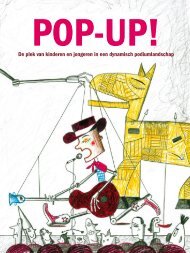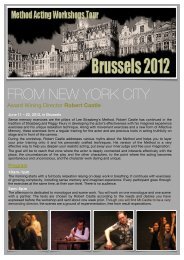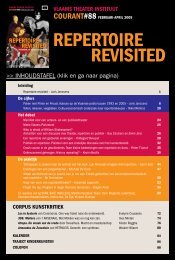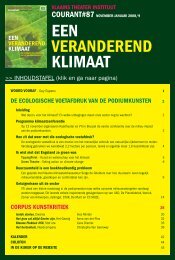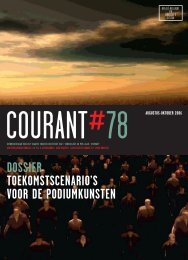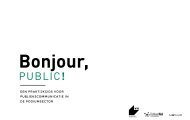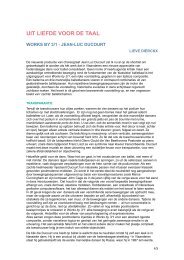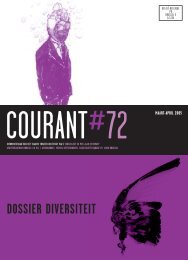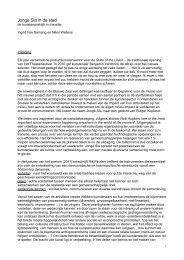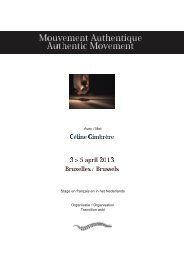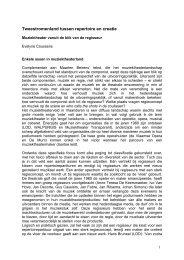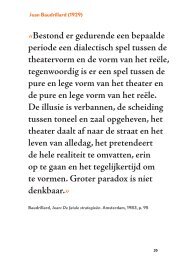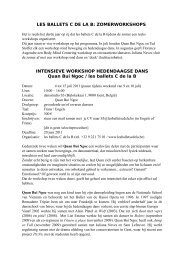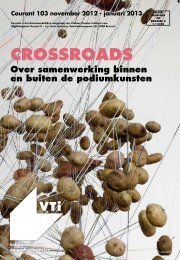music theatre in flanders - Muziekcentrum Vlaanderen
music theatre in flanders - Muziekcentrum Vlaanderen
music theatre in flanders - Muziekcentrum Vlaanderen
You also want an ePaper? Increase the reach of your titles
YUMPU automatically turns print PDFs into web optimized ePapers that Google loves.
different when it comes to subsidies. As a result, two overall approaches<br />
towards a def<strong>in</strong>ition have emerged. In the first, <strong>music</strong><br />
<strong>theatre</strong> is generally def<strong>in</strong>ed negatively, as mentioned above: <strong>music</strong><br />
<strong>theatre</strong> is not text-based <strong>theatre</strong> and not opera. The second<br />
is diametrically opposed to the first: it suggests that the term<br />
‘<strong>music</strong> <strong>theatre</strong>’ is an ‘umbrella term’ designat<strong>in</strong>g all subgenres,<br />
<strong>in</strong>clud<strong>in</strong>g <strong>music</strong>al, opera, operetta, chamber opera and all sorts<br />
of experimental mixtures of <strong>theatre</strong> and stage concert.<br />
In the first, negative def<strong>in</strong>ition, the term ‘<strong>music</strong> <strong>theatre</strong>’ <strong>in</strong>volves<br />
the last group of experimental cross-over forms which escape<br />
strict def<strong>in</strong>itions. This type of <strong>music</strong> <strong>theatre</strong> fought the battle<br />
for a def<strong>in</strong>ition ma<strong>in</strong>ly to make itself known and to obta<strong>in</strong> a separate<br />
place <strong>in</strong> subsidy policies. Aesthetically, <strong>music</strong> <strong>theatre</strong> moves<br />
more <strong>in</strong>tuitively through formal experiments between different<br />
productions, with <strong>in</strong>terrelations which are perceived sooner by<br />
the makers themselves.<br />
The second – all-embrac<strong>in</strong>g – def<strong>in</strong>ition caused even more<br />
confusion. So far, we have had a fairly clear idea of what opera,<br />
operetta or <strong>music</strong>al is, as these forms have a clearly del<strong>in</strong>eated<br />
stage history and because they were thoroughly <strong>in</strong>stitutionalized.<br />
Experiments with these older, <strong>music</strong> dramatic idioms, however,<br />
have raised a general awareness of their heterogeneity. The opera<br />
scene used the term ‘<strong>music</strong> <strong>theatre</strong>’ <strong>in</strong> and out of season to<br />
<strong>in</strong>vigorate itself. With my students <strong>in</strong> Amsterdam, I often illustrate<br />
this with the example of the Dutch Opera, which renamed<br />
itself ‘Het Muziektheater’ on the occasion of the open<strong>in</strong>g of the<br />
new opera venue near the Amstel <strong>in</strong> Amsterdam. In a counter<br />
reaction, the state-funded opera <strong>in</strong>stitute appropriated the term<br />
to ‘rejuvenate’ itself – or rather, to claim a younger profile – <strong>in</strong> the<br />
chang<strong>in</strong>g landscape.<br />
In the early days of the amendments to the 1993 Perform<strong>in</strong>g<br />
Arts Decree, opera, operetta, <strong>music</strong>al and other multidiscipl<strong>in</strong>ary<br />
artistic expressions were <strong>in</strong>cluded <strong>in</strong> the def<strong>in</strong>ition of <strong>music</strong><br />
<strong>theatre</strong>. This def<strong>in</strong>ition gradually became more concrete, until <strong>in</strong><br />
2003 (and later <strong>in</strong> the 2006-7 advisory committee’s <strong>in</strong>troductory<br />
notes) it was decided that the ma<strong>in</strong> criterion would be that <strong>music</strong><br />
<strong>theatre</strong> organizations ‘primarily engage <strong>in</strong> <strong>in</strong>itiatives <strong>in</strong> which<br />
<strong>music</strong>, mostly performed live, is comb<strong>in</strong>ed with theatrical forms.’<br />
The advisory committee went on to def<strong>in</strong>e the theatrical aspect <strong>in</strong><br />
terms of ‘the liv<strong>in</strong>g presence of performers, actors and/or s<strong>in</strong>gers,<br />
who are responsible for the dramatic action’. A recent performance<br />
by the German <strong>music</strong> <strong>theatre</strong> maker He<strong>in</strong>er Goebbels,<br />
Stifters D<strong>in</strong>ge, even challenges this last notion: all <strong>music</strong> was reproduced<br />
by <strong>music</strong>al robots <strong>in</strong> a giant <strong>in</strong>stallation of tubes, valves,<br />
membranes, prepared pianos, etc. Similar experiments can be<br />
noted <strong>in</strong> Flanders <strong>in</strong> the radical performances by, among others,<br />
Godfried-Willem Raes and Moniek Darge <strong>in</strong> the alternative experimental<br />
<strong>music</strong> circuit of the Ghent-based Logos Foundation.<br />
Subsidized <strong>music</strong> <strong>theatre</strong> companies are, for that matter, more<br />
frequently try<strong>in</strong>g to establish synergies with new, possibly <strong>in</strong>teractive<br />
<strong>music</strong> and sound technologies.<br />
As a result of the explosion of multimedia and new multidiscipl<strong>in</strong>ary<br />
forms of <strong>music</strong> <strong>theatre</strong>, it has become extremely difficult<br />
for an advisory committee to apply an ultimate def<strong>in</strong>ition as<br />
a standard. The problem is becom<strong>in</strong>g even more complicated because<br />
experimental <strong>music</strong> has developed <strong>in</strong>to a complex knot of<br />
styles and composition techniques, <strong>in</strong> which the tone is no longer<br />
set by one s<strong>in</strong>gle avant-garde. Music <strong>theatre</strong>s nowadays are junctions<br />
where <strong>in</strong>dividual artist trajectories come together, where<br />
boundless eclecticism goes hand <strong>in</strong> hand with formal experiment<br />
and the search for new sonic textures, sounds and technologies.<br />
Because the structurally subsidized companies have little budget<br />
available for experiment, project grants are vitally important to<br />
ma<strong>in</strong>ta<strong>in</strong> <strong>music</strong> <strong>theatre</strong>’s laboratory function.<br />
48 49<br />
table of contents



